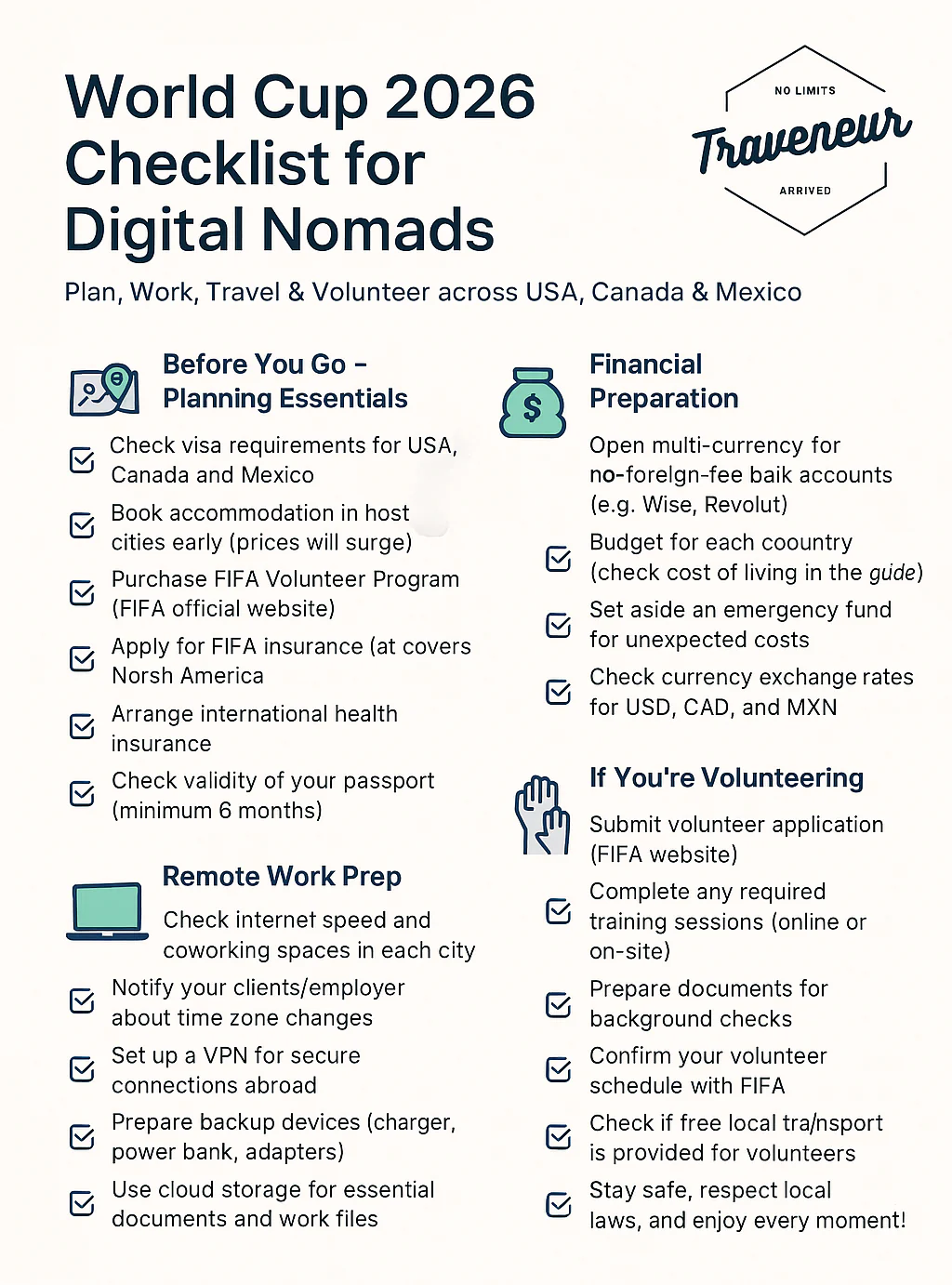FIFA World Cup 2026: Travel Tips, Remote Work Opportunities and How to Become a Volunteer
The FIFA World Cup 2026 represents something unprecedented in football history—the first tournament jointly hosted by three nations. As the United States, Canada, and Mexico prepare to welcome the world, an extraordinary opportunity emerges for digital nomads and remote workers to blend their professional lives with one of the planet’s most celebrated sporting events.
This isn’t just about catching matches between video calls. The tri-national format creates a unique travel corridor spanning diverse cultures, time zones, and economic landscapes—perfect for the modern remote worker seeking adventure without sacrificing productivity.
Whether you’re planning to work from bustling coworking spaces, volunteer behind the scenes, or simply explore new cities while maintaining your career, here’s your comprehensive guide to making the most of this once-in-a-generation event.
🗺️ The Host Cities: Where Football Culture Meets Remote Work Paradise
Sixteen cities across three countries will host matches, each offering distinct advantages for the traveling professional.
🇺🇸 United States: The Digital Infrastructure Powerhouse
New York/New Jersey stands as the obvious choice for those seeking world-class networking opportunities. The coworking scene here rivals anywhere globally, though your wallet will feel the impact. The cultural richness and 24/7 energy make it ideal for those who thrive in intense urban environments.
Los Angeles offers the perfect blend of tech culture and laid-back California vibes. The city’s sprawling geography means you can work from beachside cafes in Santa Monica one day and trendy downtown lofts the next. The established digital nomad community provides instant networking opportunities.
Miami pulses with Latin energy and maintains strong business ties throughout the Americas. The city’s bilingual culture and relatively affordable cost compared to NY/LA make it increasingly popular among remote workers, especially those serving Latin American markets.
The San Francisco Bay Area needs little introduction for tech professionals. While expensive, the concentration of industry connections and proximity to stunning nature reserves like Big Sur create unmatched work-life balance opportunities.
Seattle’s coffee culture isn’t just a stereotype—it’s a way of life that perfectly complements remote work rhythms. The city’s progressive vibe and outdoor accessibility appeal to professionals seeking inspiration beyond their screens.
Meanwhile, Dallas, Houston, Kansas City, Atlanta, Philadelphia, and Boston offer compelling alternatives with lower costs but equally rich cultural scenes and growing nomad communities.
🇨🇦 Canada: Multicultural Hubs with Excellent Infrastructure
Toronto consistently ranks among the world’s most livable cities, and its multicultural fabric creates unique business opportunities. The city’s efficient public transport system eliminates the car dependency that plagues many North American cities.
Vancouver combines urban sophistication with immediate access to mountains and ocean. For remote workers who find inspiration in nature, few cities offer such dramatic landscapes within city limits.
🇲🇽 Mexico: The Budget-Conscious Nomad’s Dream
Mexico City has emerged as Latin America’s digital nomad capital, and for good reason. The cost-to-quality ratio remains unbeatable, with world-class food, rich history, and a thriving coworking ecosystem. The city’s altitude takes some adjustment, but the cultural rewards are immense.
Monterrey surprises many with its modern business infrastructure set against dramatic mountain backdrops. It’s Mexico’s industrial heart with significantly lower costs than traditional nomad destinations.
Guadalajara represents Mexico’s Silicon Valley, with a young, tech-savvy population and creative energy that fuels innovation. The city’s colonial charm mixed with modern amenities creates an inspiring work environment.
💻 Remote Work During the World Cup: Practical Considerations
The infrastructure across all host cities supports remote work excellently, but visa requirements vary significantly:
United States: Tourist visas (B1/B2) or ESTA allow remote work for non-US clients. The extensive coworking network in major cities ensures reliable internet and professional environments.
Canada: eTA or tourist visas permit remote work for overseas employers. Canadian cities offer some of the world’s best work-life balance, though costs can be substantial.
Mexico: Visa-free entry for most nationalities up to 180 days, with the option for Temporary Resident Visas for longer stays. The country’s growing digital nomad infrastructure, combined with favorable exchange rates, creates compelling long-term opportunities.
The time zone advantages across North America work particularly well for European clients, with Mexican cities offering the best overlap for both European and Asian markets.
💸 Budget Reality Check: What Will It Actually Cost?
Here’s what you can expect to spend monthly in each host city:
| City | 🏠 Accommodation | ☕ Coworking | 🍽️ Meal (Local) | 🚇 Transport Pass | 💡 Overall Budget (Monthly) |
|---|---|---|---|---|---|
| New York | $2,500+ | $350 | $15 | $127 | $4,000+ |
| Los Angeles | $2,200+ | $300 | $14 | $100 | $3,500+ |
| Miami | $1,800+ | $250 | $12 | $70 | $3,000+ |
| Toronto | $1,900+ | $250 | $12 | $110 | $3,200+ |
| Vancouver | $2,000+ | $250 | $13 | $102 | $3,300+ |
| Mexico City | $900+ | $150 | $7 | $25 | $1,500 – $2,000 |
| Monterrey | $800+ | $120 | $6 | $22 | $1,400 – $1,800 |
| Guadalajara | $850+ | $120 | $6 | $22 | $1,400 – $1,900 |
Mexican cities clearly offer the best value proposition, allowing you to experience the World Cup atmosphere while maintaining a sustainable budget for extended stays.

🙌 Volunteering at FIFA World Cup 2026: Behind-the-Scenes Access
Becoming a FIFA volunteer offers unique access to the tournament’s inner workings while building international connections that can last a lifetime.
Application Process
The official FIFA Volunteer Programme website will open applications between late 2025 and early 2026. The process requires personal details, skill assessments, language proficiency tests, and availability confirmation for training sessions.
Requirements and Expectations
Volunteers must be 18 or older with basic English proficiency (additional languages significantly boost acceptance chances). The commitment includes mandatory pre-tournament training and availability during assigned shifts.
What You Receive
While the position is unpaid and doesn’t cover travel or accommodation, benefits include official FIFA gear, meals during shifts, potential free public transport, exclusive behind-the-scenes access, and invaluable networking opportunities with international professionals.
Strategic Timing
Plan to submit applications immediately when they open, as popular host cities receive far more applications than available positions.
🌍 Creating Your Ultimate World Cup Remote Work Experience
The 2026 World Cup offers an unprecedented opportunity to combine professional growth, cultural immersion, and sporting passion. The tri-national format means you could potentially work from Mexico City’s affordable coworking spaces, volunteer at matches in Toronto, and network with tech professionals in San Francisco—all within a single tournament period.
For remote workers, the timing couldn’t be better. The acceptance of location-independent work, combined with North America’s excellent digital infrastructure, creates possibilities that didn’t exist during previous World Cups.
Consider this: you could spend the group stage working from Mexico City’s vibrant Roma Norte neighborhood, move to Toronto for the knockout rounds while volunteering on weekends, and finish in Los Angeles networking with the global business community that always emerges around major sporting events.
The key is early planning. Accommodation in host cities will become increasingly expensive as the tournament approaches, and volunteer positions in popular cities fill quickly. Start planning now, and you’ll position yourself for an experience that combines professional development, cultural exploration, and sporting history in ways that may never be possible again.

➕ Essential Resources
- FIFA Official Website
- FIFA Volunteer Program
- Nomad List – Cost of Living by City
- Traveneur – Remote Work & Travel Tips
Ready to plan your World Cup remote work adventure? Start with visa research and budget planning—the early bird catches the best coworking spaces and volunteer opportunities.
Related Post: How to Budget for a Digital Nomad Lifestyle













